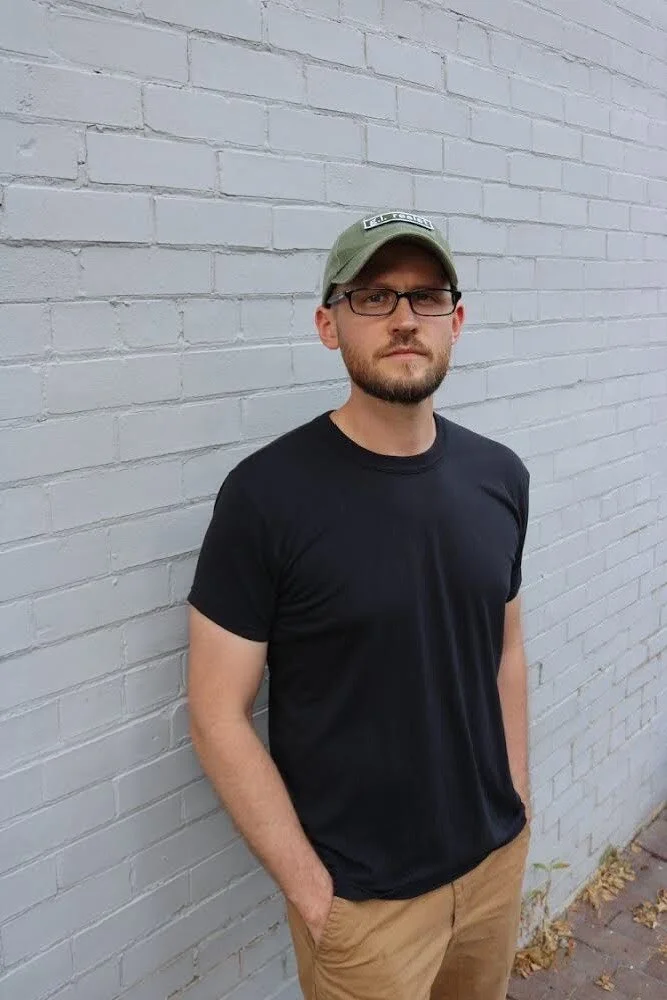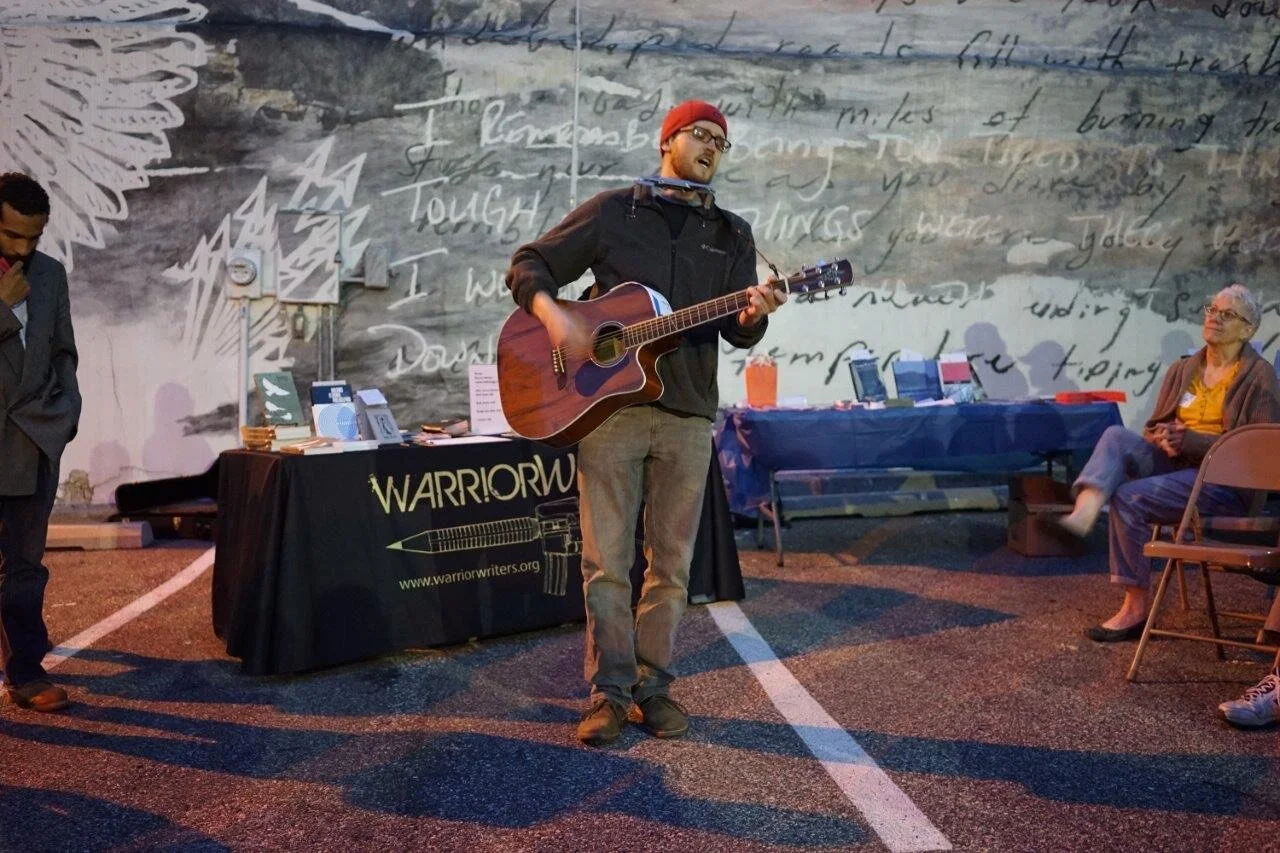What is your name?
Kevin Basl
Where are you from?
I currently live near Ithaca, NY. I grew up in the wilds of Western, PA.
Why did you choose writing as your main form of expression?
I’ve always been a writer in one form or another. As a kid, I produced a comic book series that I passed around at school. As a teenager, I wrote flash fiction stories in the vein of Franz Kafka. In college, before I joined the army, I majored in journalism. Then, throughout my five years in the army, I journaled and started writing longer Kafka-eque stories. But I didn’t take writing seriously--feeling like I actually had something to say, and so making writing the central activity of my life--until after the army, around the age of 27 or 28. That’s when I went for an MFA in fiction and started seeking publication.
I chose writing as my primary mode of artistic expression--or, rather, it chose me--because of how I’m wired. I like solitude, working alone and spending a long time on a project. And, honestly, I have trouble articulating my thoughts in speech--I’m introverted--and writing gives me the opportunity to say what so often I can’t speak.
Describe a bit of your experience as a soldier and how it influenced what you do now.
The army gave me two things, in regards to my creative practice. First, it gave me something to write about. Training, travelling around the country and the world, going to war, re-integrating into civilian society, witnessing militarism creep into our culture--for better or for worse, I now have a bottomless well of material. Second, it gave me a moral imperative. The Iraq War was deeply unjust, and I willingly participated in it. Going through a crisis of conscience politicized me, and it led me to anti-war activism. So my work for the past ten years has been at the nexus of creative writing and activism.
Would you like to talk about your experiences with facilitating workshops with veterans?
After I left the army in 2008, I thought I’d never step foot on a military post ever again. I wanted to close that chapter of my life and move on. Ironically, not four years after signing out of my last army assignment, I would be rolling onto Fort Belvoir, VA to help teach a writing and papermaking workshop at the USO. At first, I wasn’t sure how I’d like teaching art to service members. They can be a tough crowd. But I slipped right into the role, pretty effortlessly. I enjoyed it and kept coming back.
There’s so much I could say about facilitating workshops. It’s been inspiring, enlightening, beautiful, challenging, and I’ve made so many new friends doing the work. I’ve heard so many harrowing, fascinating and unusual stories. It’s been a great privilege to work in spaces where participants are willing to be vulnerable and share so much of themselves, the good and the bad. I’ve learned a lot about myself too, as facilitators often share their own stories in workshops. It’s hard to imagine where I’d be today without having been introduced to the veteran-focused workshop experience.
How was your pursuit of an MFA degree influential in your writing now?
The two years spent doing my MFA were crucial to my development as an artist. It was like getting thrown-in on the deep end of the literary world. What I didn’t realize at the time, however, was that I was just getting started as a writer. I went in thinking I’ll come out with a short story collection and a novel, ready to publish. In reality, I came out with two decent short story drafts! It was certainly an ego check. Just before I left, the director of my program, Don Lee, told me--and I’m paraphrasing here--The most critical time in your development as a writer will be the first five or so years after your MFA. That’s when most people quit. One of the reasons most quit, of course, is because the student loans come due. Thankfully, I used my G.I. Bill to pay for my MFA, so I’ve been able to keep writing because I’m able to stay gainfully under-employed, with no debt.
Would you like to share your thoughts on the ongoing Afghanistan situation?
It’s urgent that we help as many refugees as possible find safe haven. Pulling the U.S. military out of Afghanistan was the right thing to do, but we can’t abandon the people to whom we continually made promises of visas and a better life. We have a moral obligation to help them. That said, for twenty years, our country waged war in Afghanistan, and most Americans hardly took notice. If more citizens would have paid attention and called for accountability and transparency from our politicians and military officials, we may have gotten out of there years ago and mitigated the damage. We betrayed the Afghans, and many people lost their lives and livelihoods, and that’s an enormous tragedy. I hope people don’t forget the disastrous results of the United States’ past several military adventures, especially when the war drums start pounding in the future. Not every foreign policy challenge has a military solution. Unfortunately, the U.S. seems to not learn from its mistakes.
How do you feel about papermaking with military uniforms?
I think it’s awesome. The process has been very inspirational to me over the years, pushing me to create in ways I otherwise wouldn’t have. Using military uniforms as an artistic medium can represent an act of protest, a history lesson, a community-building exercise, and so much more. It represents many things and that’s why it’s so effective as a medium.
My MFA subject is about the meaning-making from people as a form of self-healing. What are your thoughts on the roles writing or artmaking have in this?
Art is inherently therapeutic. Everyone can benefit from a creative practice. It’s a way to unwind, reflect, play, and connect with others. It’s also a way to externalize those thoughts and memories that haunt us, that may lead to destructive behaviors if left to fester. It can help ground a person and give them a sense of control over their life.
Something that bothers me, however, is that when combat veterans share their art, people often automatically apply the therapy label to their work which, in my view, is sometimes used as a way to avoid having a critical conversation. People need to be unafraid to ask tough questions of veterans, and veterans need to be able to give tough answers. Isn’t meaning-making, after all, a conversation?
Describe your experience with Warrior Writers and Frontline Arts.
Both organizations have helped me in many ways over the past decade. They’ve introduced me to a vast network of like-minded veteran artists. They’ve helped me gain confidence reading my work on stage and sharing difficult, uncomfortable subject matter. They’ve provided many unique and formative opportunities, like teaching at Haystack Mountain School of Crafts, reading my work at the Dodge Poetry Festival, and facilitating papermaking and writing workshops on military posts. And I shouldn’t leave out that, at various times, they’ve both employed me. But the artistic community they’ve both provided me has been indispensable and I’m not sure where I’d be today without them.
I've noticed that music has a special place in your heart. What is it about music that has you gravitated towards it?
Of all art-forms, music moves me most deeply, even more so than literature. When I really connect with a song, it gives me chills, occasionally moves me to tears. As with writing, I’ve always been a musician (a decent guitar player, certainly no virtuoso) and during my teen years and early twenties, my band was my life. There was a time when I thought that’s what I was going to do. I was going to keep playing music, regardless of what it took. There was nothing I loved more than playing live on stage with my band. But then my life went off the rails. I started drinking too much--a result of playing mostly in bars and at parties, social anxiety, failing at college, and other issues I was avoiding. The band broke up, and I joined the army to escape trouble and reroute my life. But I always had an acoustic guitar with me in the army, and on my second deployment I took recording gear with me to play around with. It kept me sane. I still record music today, in my home studio, and very occasionally I’ll play a live acoustic set. When the writing is not going well, I pick up my guitar.
How was your experience writing for Praxis in Color, and where did your ideas for writing come from?
Praxis in Color was a blog I published on the Frontline Arts website for a couple years. It was a way to delve more deeply into my experience working with the organization, politics, art history and anything else that seemed relevant and interesting. Often while facilitating papermaking and writing workshops, I would think someone needs to write about this. There is, of course, a lot of photo and video documentation of Frontline’s earlier workshops and performances. But no one was really recording the more subjective and reflective aspects of facilitating workshops and participating in the wider veteran art movement. Ideas would come from the lively conversations fellow veteran artists and I were having, exhibitions we visited, activism, books we were reading--inspiration came from all sorts of places. Unfortunately, I didn’t write a quarter of what I intended to at the time. So it goes.
Do you feel your writing style or interests have changed over the years?
Absolutely. When I first started writing about my war and military experience, I relied heavily on shock value. I thought, I’m going to show readers the horrors of war, how ugly its effects really are, so they’ll think twice about supporting future wars waged in their name. I don’t take that approach very often these days, as I don’t find it to be all that effective. It’s difficult to compete with film and photography in that regard. Plus, what is shocking anymore? Now I find myself writing about more quiet, contemplative moments--especially moments where one culture meets another, and the understandings (or misunderstandings) that come in those spaces. That’s more interesting to me and, I think, our society needs those sorts of stories now more than ever.
For more information on Kevil Basl’s work, visit:
Interview by Hugo Gatica, September 2021



